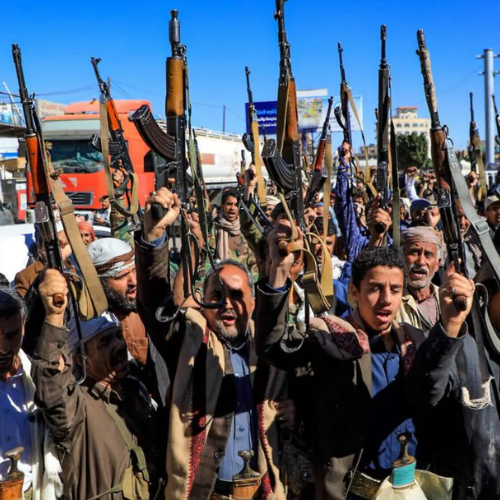The United States has recently imposed sanctions on Yemen Kuwait Bank, a financial institution in Yemen accused of supporting the Houthi movement, which has been linked to numerous attacks on global shipping. The U.S. Treasury Department announced the sanctions on Friday, stating that the Yemen Kuwait Bank was involved in illegal financial activities, including money laundering and transferring funds to the Houthi group and its allies like Hezbollah, a militant group based in Lebanon.
The move comes as part of the Biden administration’s efforts to increase pressure on the Houthis, who have been involved in violent actions that threaten global trade. By freezing any U.S.-based assets of Yemen Kuwait Bank and preventing Americans from engaging in business with it, the U.S. hopes to disrupt the financial support that helps the Houthis continue their attacks. These actions are intended to target the economic foundation of the group and weaken their operations.
Houthi Attacks Disrupt Global Shipping
Since November 2023, the Houthi movement, which is backed by Iran, has launched over 100 attacks on ships in the Red Sea. These attacks have caused serious damage, including the sinking of two vessels and the seizure of another. The Houthis have also killed at least four seafarers. These dangerous actions have not only caused loss of life but have also severely disrupted global shipping routes. As a result, many ships have been forced to take longer, more costly routes around the southern tip of Africa, avoiding the Suez Canal. This detour has increased shipping costs and delivery times, contributing to higher insurance premiums and concerns about rising inflation worldwide.
US Hits Hard: Sanctions Target Iran and Houthi Networks
The Houthis’ actions in the Red Sea have prompted international concerns about the safety of maritime trade. The area is a vital passageway for goods traveling between Europe, the Middle East, and Asia. Disruptions in this region can lead to delays in the supply of products and raise prices for consumers globally.
US Sanctions Target Houthi Support Network
The sanctions on Yemen Kuwait Bank are part of a larger effort by the U.S. government to target financial institutions that help fund the Houthis’ activities. The U.S. Treasury Department has accused the Yemen Kuwait Bank of playing a key role in helping the Houthis exploit Yemen’s banking system for money laundering purposes. The Houthis, who seized control of much of Yemen in 2014, including the capital city, Sanaa, have used the country’s financial system to funnel money to their military operations and extend their influence in the region.
In addition to attacking ships, the Houthis have also launched missiles and drones toward Israel, and Israel has retaliated with airstrikes against Houthi-controlled areas. These actions have made the ongoing conflict even more dangerous and unpredictable.
Yemen’s Houthi Forces and Advanced Iranian Weapons Fuel Unrest in the Middle East
The U.S. and its allies, including Britain, have been taking steps to counter the growing threat from the Houthis. In December 2023, a multinational operation was launched to protect commerce in the Red Sea. Additionally, the U.S. has carried out airstrikes targeting Houthi weapons storage facilities to weaken their military capabilities.
As part of the sanctions, Yemen Kuwait Bank’s U.S. assets have been frozen, and any dealings with the Yemen Kuwait Bank by American citizens are now prohibited. This is a significant step in the U.S. strategy to isolate the Houthis financially and limit their ability to carry out further attacks. The sanctions also send a clear message to other financial institutions that may be supporting the Houthis’ activities, warning them that they could face similar measures.
The latest sanctions mark a continued effort by the U.S. to use economic pressure as a tool to curb the influence and actions of groups like the Houthis, which pose a threat to global stability and security. By targeting the financial networks that support these groups, the U.S. hopes to weaken their power and reduce their ability to continue destabilizing the region.


